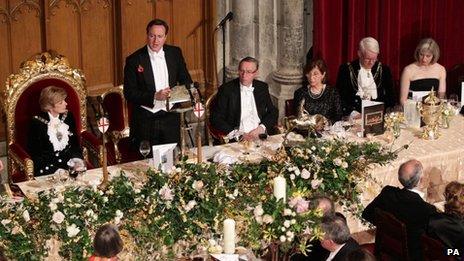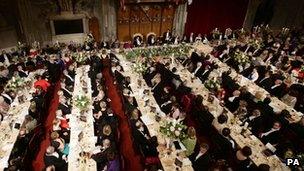Cameron to lead China trade delegation
- Published

Mr Cameron was giving his annual address at the Guildhall in the City of London
David Cameron is to lead a delegation of ministers and business figures to China next month, he has announced.
The move represents a warming of relations after a dispute over the PM's decision to meet the Dalai Lama in May.
And it comes a month after the chancellor, George Osborne, fronted a business delegation to China.
Mr Osborne's Autumn Statement, which sets out the UK government's tax and spending proposals, has been put back 24 hours to accommodate the trip.
It will now take place on 5 December, the Treasury said.
'Varied markets'
The prime minister announced the trade visit during his annual speech to the Guildhall in the City of London where he also announced increased UK aid to the typhoon-hit Philippines.
Mr Cameron, who has visited China once since he entered Number 10, said the delegation would depart in early December.
"I will take senior British ministers - as well as business leaders from every sector, large and small - to forge a relationship that will benefit both our countries and bring real rewards for our peoples," he said.
The trip would help British companies tap into China's "vast and varied markets" he said, adding: "This is a relationship that is for the long term, that matters for Britain and China, and which I look forward to continuing to strengthen in the months and years to come."
Earlier this year it was reported the prime minister had been barred from the country by Chinese officials.
They reacted angrily when Mr Cameron met with the Dalai Lama, the exiled Tibetan leader.
At the time, the PM's spokesman said he planned to visit the country later in the year.
Statement delayed
The December trip would be the UK government's second attempt in as many months to improve economic links with China.

The annual Guildhall address is traditionally used to outline foreign policy proposals
In October the chancellor announced a relaxation of visa restrictions for Chinese visitors and moves to allow Chinese companies to invest in British nuclear power stations.
Giving his annual address to the Lord Mayor's banquet, the PM also said he wanted to encourage more investors from the Gulf with a new electronic visa waiver system for short-term visitors.
He added that the "global economy" was not a "zero sum game".
"As the number of university places surges in India, as China creates more patents than any other country in the world, and as Brazil becomes the world's first sustainable biofuels economy, people ask the question, 'will they be the winners and we be the losers?' I believe we need to say a very firm 'No',".
- Published11 November 2013
- Published14 October 2013
- Published14 October 2013
- Published7 May 2013